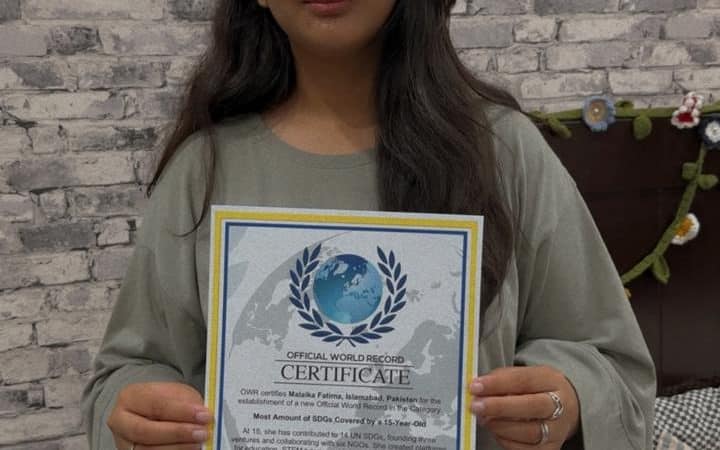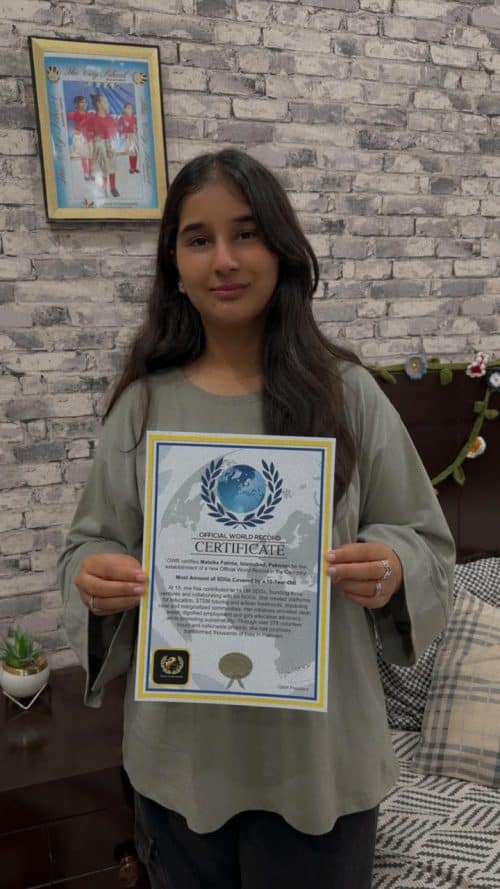
Most Amount Of SDGs Covered By A 15 year Old

In today’s world, where global challenges such as poverty, inequality, climate change and limited access to education continue to dominate headlines, the need for young leaders to step forward has never been greater. Among these leaders stands Malaika Fatima, a 15-year-old from Islamabad, Pakistan, whose story has already inspired many across her country and beyond. Malaika has achieved what few could even imagine at such a young age. She has been officially recognized by Official World Record for contributing to fourteen of the United Nations Sustainable Development Goals, a remarkable accomplishment that reflects her determination to address the interconnected issues of society with passion, innovation and compassion. Her efforts have directly or indirectly touched more than a million lives nationwide, making her one of the youngest yet most impactful social advocates in Pakistan’s history.
The recognition given to Malaika for covering the most SDGs by a 15-year-old is not just an acknowledgment of her hard work; it is a testament to what is possible when young people are given space to act. At an age where most teenagers are still exploring their personal ambitions, Malaika has already founded three ventures, collaborated with six NGOs, volunteered more than 278 hours and created meaningful platforms that address pressing challenges. From tackling poverty to promoting education, from empowering women to fighting climate change, her work embodies the very spirit of the SDGs and the broader vision of building a more sustainable and inclusive world.
Malaika’s journey is one of extraordinary breadth. Through her entrepreneurial initiative ArticraftSoul, she gave rural artisans, especially women, an opportunity to secure fair wages for their handicrafts. These women, often trapped in cycles of poverty and exclusion, were able to turn their skills into sustainable sources of income. What makes this effort particularly significant is that Malaika reinvested the profits from ArticraftSoul into clean water projects for rural areas, ensuring that families had access to safe drinking water. This initiative not only provided financial independence for women but also addressed the fundamental right to health and dignity for entire communities.
Her second venture, Chapter by Chapter, is a free library and education platform that emerged from her deep belief that access to knowledge should not be a privilege. By creating an opportunity for people to borrow and donate books freely, Malaika made learning resources available to children and communities who otherwise had limited or no access. Education has always been central to her mission and her leadership as a Student Body Ambassador for Girl Rising further amplified her advocacy for gender equality in education. In this role, she not only promoted the importance of girls staying in school but also worked with families and communities to break down barriers that prevent girls from pursuing education.
Malaika’s third venture, STEM Support, reflects her foresight into the future of learning and employment. By providing science, technology, engineering and mathematics tutoring for underprivileged children, she has opened doors for young learners to enter fields that are often inaccessible to marginalized communities. The program equips children with skills critical for the modern world while also empowering them to dream beyond traditional limitations.
Her collaborations with grassroots organizations and NGOs further demonstrate her wide-ranging commitment. With MAS, Malaika personally supported underprivileged students to remain in education and convinced parents to re-enroll daughters who had dropped out of school. With the Local Poverty Project, she promoted rural development and created pathways for underprivileged women to secure jobs and provide food for their families. With WWF, she participated in climate action campaigns and contributed to wildlife conservation programs, raising awareness about environmental sustainability in a country that faces serious ecological challenges. Her long-term volunteering with KPK Wildlife Protection, where she dedicated over 278 hours including scout camping and awareness campaigns, showcased her dedication to preserving wildlife and protecting natural habitats.
The scale of Malaika’s work is not only broad but also deeply interconnected. She recognized early on that challenges such as poverty, hunger, lack of education and climate change are not isolated problems but rather parts of a larger system of inequality. By working across fourteen SDGs, she has built a holistic model of impact that uplifts marginalized groups in multiple ways. For example, her initiatives to create dignified employment for women also addressed food insecurity by enabling these women to provide meals for their families. Her commitment to education was paired with advocacy for gender equality, recognizing that no meaningful educational progress can occur without equal opportunities for girls. Her passion for environmental sustainability was linked to her belief that without a healthy planet, no social or economic progress can last.
Through these combined efforts, Malaika Fatima has already touched the lives of more than one million people across Pakistan. These are not abstract figures but represent real stories of transformation. They include the girls who returned to classrooms because their parents were convinced that education was a right worth fighting for, the artisans who received fair prices for their crafts and could finally provide food and shelter for their families, the children who gained access to tutoring and books that inspired them to dream bigger, the women who could earn a livelihood while preserving their dignity and the families in rural areas who could drink clean water for the first time.
Her story also highlights the importance of volunteerism and personal sacrifice. Balancing her studies with social initiatives, Malaika has devoted hundreds of hours to grassroots causes, demonstrating discipline, compassion and leadership far beyond her years. The Official World Record recognition is therefore not simply about numbers or categories as it symbolizes the extraordinary spirit of a young girl who chose to use her time and talent for the betterment of others.
Malaika’s recognition as the youngest social advocate covering fourteen SDGs provides inspiration not only for her peers but also for adults, policymakers and leaders who often underestimate the capacity of youth. She has proven that leadership is not defined by age, wealth or status but by vision and courage. Her story is a reminder to the global community that investing in young leaders is not optional but essential for achieving sustainable development.
Looking ahead, Malaika’s journey has only just begun. With her passion, resilience and innovative mindset, she is well positioned to continue expanding her impact. Her work provides a model of youth leadership that integrates entrepreneurship, education, advocacy and grassroots activism into one unified approach to change. It also sets a precedent for future generations, showing that even the youngest voices can drive the largest transformations.
At fifteen years old, Malaika Fatima has already etched her name into history, not just as a world record holder but as a changemaker whose actions embody the vision of the United Nations’ 2030 Agenda. By founding ventures, collaborating with NGOs and volunteering tirelessly, she has demonstrated what is possible when determination and compassion meet opportunity. Her recognition is both a celebration of what she has accomplished and a call to action for others to follow her example. Malaika’s journey proves beyond doubt that when youth rise, communities are empowered and the world takes a step closer to justice, equality and sustainability.
